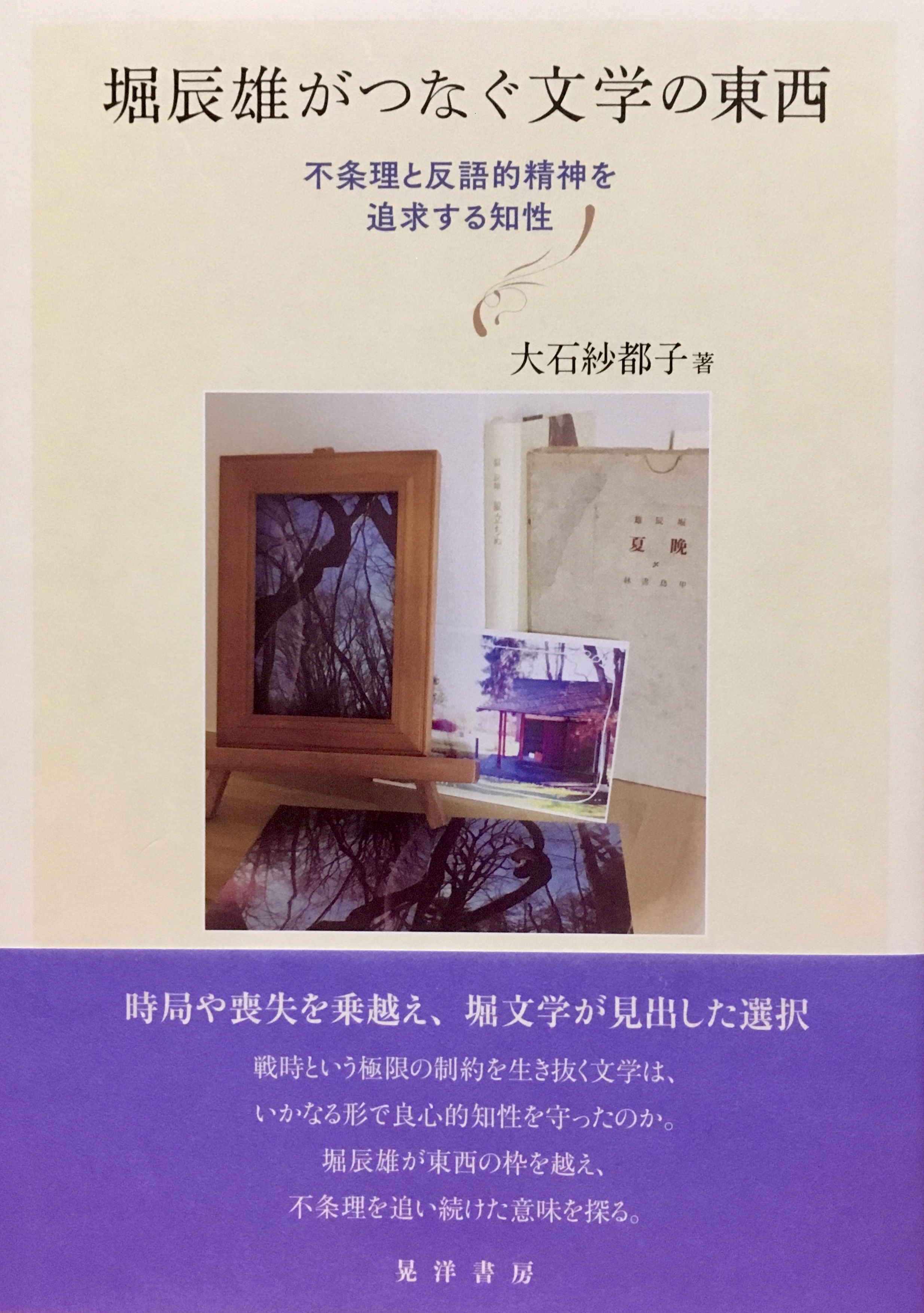
Title
Hori Tatsuo ga tunagu bungaku no touzai (East and West as connected by Tatsuo Hori in literature - The intelligence to pursue the indomitable spirit while accepting and withstanding absurdity and contradictions)
Size
298 pages, A5 format
Language
Japanese
Released
March 30, 2019
ISBN
9784771031746
Published by
Koyo Shobo
Book Info
See Book Availability at Library
Japanese Page
The academic and social significance of this book lies in its reexamination of the possibilities of literature that were cultivated under the war regime(especially during the World WarII) and ideological control. I attempted to investigate and analyze the historical meaning of the relationship between Western literature and Japanese classical literature in the creation of Tatsuo Hori, and elucidate the contemporary situation of the literary people at the time.
Tatsuo Hori is known for writing works that were influenced by Western literature, such as “Sei-Kazoku (The Holy Family)” and “Kaze-tachinu(The wind has just blown).” However, in the Showa 10s era, he shifted his interest to Japanese classical literature and depicted death and tragedies in his works, as though he was following the trend of “classical regression.” At first glance, these tracks appear to be dangerous things that can be in sync with nationalism and the aesthetics of wartime death, but, in fact, it was an original footprint that was distinguished from the restorationism of those days.
Specifically, this book newly points out the source of Hori's works (quotations or similar sections of previous major masterpieces) with reference to his collection of books and hand-drawn materials such as less-popular editions of “Ise Monogatari (Tales of Ise),” “Genji Monogatari (Tale of Genji),” “Konjaku Monogatari (The collection of Konjaku-monogatari),” “La Porte étroite (Narrow Gate),” " À la recherche du temps perdu (In search of lost time),” and Chinese poetry.
If we delve into the theme of the works, we can see that Hori had focused solely on the intention to live of the human beings who continued in loneliness or sadness rather than seeking the reward of death. This is a statement of anti-war that Tatsuo Hori carefully selected, using his knowledge of Western literature while keeping his enlightened perspective in a limited range because of his own illness and historical changes he had experienced.
At the same time, it becomes clear from such concrete testimonials that the view with which Tatsuo Hori gazed at effective means of fusing Eastern and Western literature was not simplistic; rather, it was also based on an acute and essential understanding of the academic world during that time.
Using Hori's literature as a clue, if we look at the situation of the academic world during the war, it was not necessarily war-torn nationalism that could be shared by intellectuals but the conflict between how to make use of tradition while having a spirit of criticism of modernity. Contemporary intellectuals were under the control of the war regime, in which a clear anti-war appeal was impossible; however, they had access to observational readers so that they did not get stuck in metaphors such as“East or West,” “modernization or anti-modernization,” and so on.
What should be especially emphasized in the movement toward the reappraisal of classical literature of those days is a serious awareness of the type of meaning that man finds in misfortune or despair. If the misfortune that was not desired is recognized as fate alone, there is nothing. On the other hand, the strength that comes from reading even misfortune as a part of one’s own life enables consistent autonomy that is unaffected by the surrounding tendencies of war. It can be said that this proves that human intelligence is backed by literary imagination. As a matter of fact, the possibility of such a widespread potential also existed in the issues surrounding the Showa era, such as the ideological turn from Marxism and the “Nihon Roman-ha (Japanese romantic group).” However, why were intellectuals unable to stop the war?
On the other hand, what choice could the intellectuals at the time exercise in the compulsory situation where they could not choose freely: life or death, resistance or non-resistance, and so on? The issues can elucidate why works such as “Kaze-tachinu(The wind has just blown),” which portrays an unrealistic picture of wartime, were created in those days and said to be literary achievements that still exist today.
(Written by: OISHI Satoko / October 02, 2020)
Related Info
「昭和文学研究」第80集 ”Showa Bungaku Kenkyu (Showa Literary Studies)” No.80, Association for Showa Literary Studies Mar. 1, 2020)
「大波小波」”Onami Konami (Tokyo Shimbun (Tokyo Newspaper)” June 6, 2019)
「日本近代文学」第101集”Nihon-Kindaibungaku (Modern Japanese Literary Studies)” vol.101, Association for Modern Japanese Literary Studies Nov. 15, 2019)



